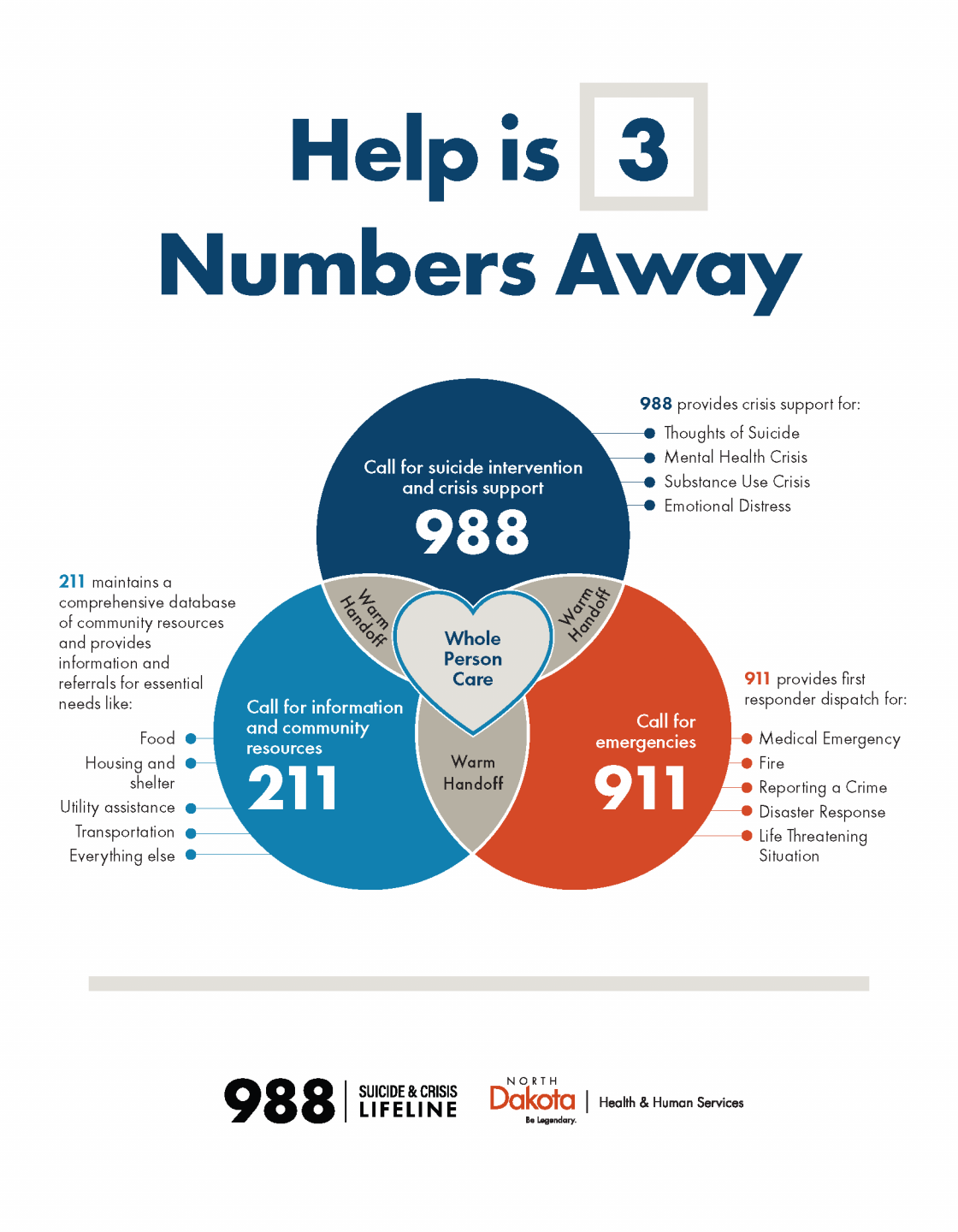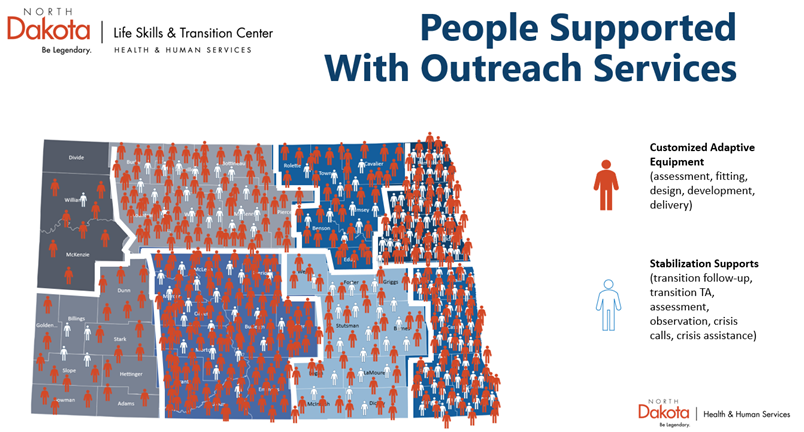If you are currently experiencing a mental health crisis,
please dial 988 to receive immediate assistance.

Anyone having a behavioral health crisis can call 988 for 24-hour help. People with intellectual or developmental disabilities will be connected to one of our agency's Crisis Coordinators within 24 hours. Our coordinators work with teams from North Dakota Health and Human Services regional human service centers to provide emergency support.
 Our agency has expanded its crisis support services to help people with intellectual and developmental disabilities. Our goal is to help people lead successful lives in their local communities.
Our agency has expanded its crisis support services to help people with intellectual and developmental disabilities. Our goal is to help people lead successful lives in their local communities.
Life Skills Statewide Crisis Support Team has two parts:
1. Statewide Crisis Stabilization Coordinators: These staff members respond to intellectual and developmental disability crisis in a person's home. They will complete on site observations as well as provide support, training, and advice to families, providers, and community partners.
2. Applied Behavior Analysts: These experts assess and help with intellectual and developmental disability behavioral issues. They work on a fee-for-service basis and consult with families and over twenty provider agencies across the state.
Transition Support to Community Providers
Each person at LSTC has a personalized transition plan created with our team, a community provider team, and a developmental disability program manager.
We have always supported people moving into the community. This process started as a two- or three-day transition program. However, as people's needs have increased, so has the transition time. Now, LSTC provides support for at least five to seven days and, in some cases, up to four weeks during the transition process.
Statewide Supports and Services
Adaptive Equipment Services provides quality, personalized adaptive equipment to people in North Dakota. We have a workshop on our Grafton campus. Our mobile team will travel across the state to create or modify equipment based on personal needs. We also participate in the ND AT4ALL program, offering gently used equipment for free.
In the crisis intervention program, we offer consultative services to people and other agencies. Our team helps prevent crises that could cause people with intellectual and developmental disabilities to lose their jobs, homes, friends, and family.
Our crisis team provides:
- Consulting
- Assistance in Staff Training
- Program Development
- Personal Coaching
We also have special programs for people with developmental disabilities who have:
- Complex Healthcare Needs
- Significant Behavioral Issues
- Inappropriate Sexual Behaviors
- Other Criminal Behavior
CARES Therapy Clinic is located on the LSTC Campus. It is an outpatient therapy clinic that helps eligible people receive developmental disability services or other related services to remain in their home or community setting.
The CARES Clinic also provides physical, occupational, and speech therapy services. They work with the Adaptive Equipment Services team to provide adaptive equipment seating assessments, and can even offer dietician services. The clinic is located in the Therapy Services Building at 801 W. Cedar Drive, Grafton ND.
The Forensic Evaluation Team provides evaluations for courts on issues of guardianship, fitness to proceed (adjudicative capacity), culpability, and criminal responsibility. Evaluation is conducted only with court orders and generally is completed by telehealth, in the defender's community, appointment in the campus offices, or in residence if the person is being admitted for a brief stay. All forensic evaluations are submitted to the Superintendent's Office at the North Dakota State Hospital, for which those referencing people receiving developmental disability services should be clearly identified including the name and contact information of the developmental disability program manager.
LSTC provides local area coordination with:
- Positive Behavior Support Committee - Peer Technical Review provides peer technical review of positive support plans for people receiving services at the LSTC, REM-ND, Friendship, and Red River Support Services.
- Human Rights Committee provides a due process review for people receiving services at the LSTC, REM-ND, Friendship, and Red River Support Services, and any other service providers.
Meet Our Crisis Stabilization Team
 Kris Tisdale - Outreach and Crisis Stabilization Program Director, MSW
Kris Tisdale - Outreach and Crisis Stabilization Program Director, MSW
Kris received her Master's in Social Work from the University of North Dakota and has been employed at the Life Skills and Transition Center for about 40 years. She has worked as a Behavior Modification Specialist, QIDP, and Unit Director before her current position as the Outreach and Crisis Stabilization Program Director. She has experience working with people who have a wide range of disabilities and co-occurring behavioral health conditions including those with sexual offending histories, complex medical conditions, and end-of-life care. For the past 15 years, most of her work has been focused on crisis stabilization, outreach, and preventing institutionalization. She has presented as part of our team at state and national conferences on crisis services, rights restoration, forensic evaluations, and the transformation of a state-run institution.
In her free time, she enjoys reading, gardening, and spending time with her nine grandsons.
Email: ktisdale@nd.gov
 Jen Hooey - Crisis Stabilization Program Manager
Jen Hooey - Crisis Stabilization Program Manager
Jennifer Hooey has worked in the field of developmental disabilities in various roles for 37 years. Currently, she is the Crisis Stabilization Program Manager of our Outreach Services at the Life Skills and Transition Center. She has presented as part of our teams at state and national conferences, discussing topics like crisis services, rights restoration, forensic evaluations, and the transformation of a state-run institution. The variety of her work experiences at LSTC has enabled her to be knowledgeable, organized, well-trained, and versatile when supporting the needs of people at risk of institutionalization.
She enjoys time with her husband, playing with her dogs, and traveling in her free time.
Email: jhooey@nd.gov
 Shannon Lennie – Crisis Stabilization Coordinator
Shannon Lennie – Crisis Stabilization Coordinator
Shannon has worked in various roles supporting people with intellectual developmental disabilities. He has served as a direct support professional, program coordinator, staff trainer, safety coordinator, middle school science educator, elementary teacher, and currently as a crisis stabilization coordinator. These diverse experiences are now used to support individuals at risk of overwhelming local community resources to develop their independent living skills allowing them to stay in their homes successfully.
He holds an elementary education degree with a minor in science from Minnesota State University-Moorhead. Shannon continues to share his expertise as part of multiple statewide training programs, including the Train the Trainer program used by agencies in North Dakota to train their staff in safe and effective therapeutic response techniques. His diverse experiences have allowed him to present at statewide conferences on topics ranging from program coordination to creating floral activities.
In his free time, Lennie enjoys fishing, hunting, traveling, podcasting, co-working a flower shop, and contributing to North Dakota floral conventions.
Email: slennie@nd.gov
 Rachel Johnson – Crisis Stabilization Coordinator
Rachel Johnson – Crisis Stabilization Coordinator
Rachel is based in West Fargo and has worked in the developmental disabilities field for 15 years. Rachel is passionate about helping people navigate tough situations, especially during times of crisis. Rachel believes in bringing empathy and expertise to every situation, ensuring that those she works with feel heard, supported, and empowered.
Email: rachejohnson@nd.gov
 Angela Bray – Crisis Stabilization Coordinator
Angela Bray – Crisis Stabilization Coordinator
Angela received a bachelor’s degree from the University of North Dakota and has been employed as a crisis stabilization coordinator with the Life Skills and Transition Center since May 2023. Before that, she worked at a Minot area provider as a supervisor, employment coordinator, contract administrator, and assistant director for 13 years. She participated in a three-year pilot project to advance employment and community participation for people with significant disabilities in North Dakota, as well as the National Expansion of Employment Opportunities Network (NEON) to develop strategic plans for increasing employment opportunities.
She has presented as part of a team at state conferences on customized employment, employability, and utilizing the discovery process in the education system. She earned a National Certificate of Achievement in Employment Services (ACRE). She is proficient in assessing client needs and collaborating with multidisciplinary teams to ensure optimal outcomes. She is committed to empowering individuals with disabilities and promoting their independence and well-being.
In her free time, she enjoys gardening, raising chickens, and spending time with her family, including her three grandchildren and two granddogs.
Email: abray@nd.gov
 Shawn Haakenson – Crisis Stabilization Coordinator
Shawn Haakenson – Crisis Stabilization Coordinator
Shawn started working for the Life Skills and Transition Center Statewide Outreach Program as a crisis stabilization coordinator in February 2021 after working for over a decade for the ND Department of Corrections and Rehabilitation (DOCR). While at DOCR, he spent numerous years as a supervisor of their special assistance unit that housed people struggling with an IDD/MI dual diagnosis. Also, during the time spent working for the DOCR, he was a part of its crisis negotiations team and was a nationally certified hostage negotiator.
Shawn’s past experiences in handling crisis situations and de-escalation are core to his current passion for assisting people with dual diagnoses to avoid institutionalization. He does this by developing programs for people to gain the skills they need to become more independent.
In his free time, Shawn enjoys traveling, camping and fishing with his family, tinkering with home projects, working on custom vehicles, and riding his motorcycle.
Email: shaakenson@nd.gov
 Taylor Van-Dyke – Crisis Stabilization Coordinator
Taylor Van-Dyke – Crisis Stabilization Coordinator
Taylor received a bachelor’s degree in criminal justice with a minor in psychology from North Dakota State University. He has worked for the Life Skills and Transition Center for one year. Before that, he has worked in the field of developmental disabilities for over 11 years, ranging from direct support professional, to management, and administrator.
Taylor enjoys spending time with his family, sports, and working out.
Email: tayvandyke@nd.gov
 Beth Fraser – Crisis Stabilization Coordinator
Beth Fraser – Crisis Stabilization Coordinator
Beth has worked for the Life Skills and Transition Center for 16 years. She started out as a direct support professional in Maplewood and then joined the CARES team as a direct support professional in 2009. She continued as a direct support professional, assisting with multiple agencies around North Dakota, until she became a crisis stabilization coordinator in 2023. Beth enjoys getting out there to meet and help those she supports and considers it very rewarding.
When she’s not at work, she can likely be found cheering on one of her three busy sons at one of their hockey, baseball, or football games.
Email: bafraser@nd.gov
 Erica Loza – Crisis Stabilization Coordinator
Erica Loza – Crisis Stabilization Coordinator
Erica has held various positions over the past eight years since beginning her work in the developmental disability field. Starting as a direct support professional to becoming a supervisor, a position she held for seven of those years, Loza went on to become module certified and received her developmental disabilities certificate from Minot State University. Erica then became a therapeutic response trainer and obtained a management certificate from Minnesota. Erica’s one-on-one experience as a direct support professional greatly benefited her while progressing into her positions as a supervisor and now as a crisis stabilization coordinator where she ensures the safety and welfare of multiple individuals vulnerable to institutionalization.
In her spare time, she enjoys spending time with her family, traveling, and cooking.
Email: eloza@nd.gov
